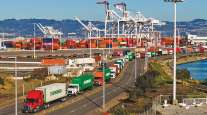Staff Reporter
Commercial Trucks Pick Up Speed on Road to Sustainability

[Stay on top of transportation news: Get TTNews in your inbox.]
Commercial trucking is making progress with sustainability, but obstacles and unknowns remain, according to a coalition of industry groups.
The State of Sustainable Fleets 2020 report analyzed sustainable fuel and vehicle technologies being adopted. The report also is intended to be a comprehensive resource for companies.
Gladstein, Neandross & Associates helped spearhead the effort.
STATE OF SUSTAINABLE FLEETS 2020: Download the report
“This is really a first-of-its kind effort to try to bring together all of the key trends,” Erik Neandross, CEO of GNA, said during a webinar. “We want to understand what’s happening in the market. What is the adoption that is happening, what are some of the insights fleets are providing. We looked at nine different commercial vehicle types and a number of different fuels and technologies across those types.”
State of Sustainable Fleets... by Transport Topics on Scribd
The report found sustainable vehicle and fuel use is growing across all categories of medium- and heavy-duty vehicles including natural gas, propane, battery-electric and hydrogen fuel cells. Sustainability also is the top motivator for purchasing decisions among early adopters within the industry.
“We’re seeing this unprecedented transformation and innovation in these markets with all kinds of fuels and technologies focusing in on sustainability,” Neandross said. “There’s two parts to that sustainability message. One is economic sustainability. These things have to pencil out and make financial sense. Then, of course, they have to be more environmentally sustainable.”
GNA is a clean transportation and energy consulting firm. Penske Transportation Solutions, Daimler Trucks North America, Shell Oil Co. and Exelon Corp. assisted in the making and sponsoring of the report.
“We’ve seen a lot of technologies and fuels that have great benefits, but there is also a lot of challenges,” Neandross said. “There has been great successes, and there has been some failures along the way.”

The report found natural gas vehicles save on fuel costs, have reduced maintenance and are quieter. The downside currently includes limited public infrastructure, higher vehicle capital costs and reduced range. Battery-electric vehicles had similar benefits and downsides. Fuel cell electric vehicles were similar except for high fuel costs. All of them had reduced or zero emissions compared with standard diesel and gasoline.
“Overall, the thing that was most notable was all of these sustainable technologies are growing,” Neandross said. “Both measures in terms of vehicle sales and fuel use. When we look at those two metrics, we see growth across the board. That’s really great to see.”
The report includes a survey that found 98% of fleets using sustainable technology expect to continue at the same level or increase their use for vehicles and fuels. That includes 17% for heavy-duty trucking companies.
“That was frankly a little surprising, because in the early years there were some hiccups along the way,” Neandross said. “Sometimes that might lead someone to say, ‘let’s just stick to diesel, we know it works.’ But we really didn’t see that with the fleets that we talked to. We saw that many of them continue forward.”
Neandross noted some of the fleets have been doubling down and increasing their investments in propane and natural gas. He added that there also is a lot of investment around electric vehicles for both battery and hydrogen.

Cota
“I would say it’s not terribly surprising for me,” said Brian Cota, vice president of sales for Freightliner trucks, a DTNA brand. “Our customers do have their own sustainability and green initiatives that they want to continue to push forward with. It’s nice to see that momentum.”
Cota added that there is momentum, but also challenges. Diesel and natural gas have been around for a while, so a lot is already known. Uncertainty, however, still surrounds some alternative fuels, such as battery-electric.
There also are infrastructure requirements such as charging stations that many places don’t have yet.
“I do see long term that there is an opportunity for this technology to not only compete from a sustainability perspective,” Cota said, “but eventually I think there will be opportunities for it to also offer a lower cost of ownership. It’s not quite there today; it’s a new technology and there’s some unknowns. But we’re going to continue to fine-tune this technology.”
The report found Class 8 tractor-trailers that adopt a suite of efficiency practices and technologies can achieve significant efficiency improvements over national averages in real-world and over-the-road applications.
“The efficiency of these technologies really just continues to increase,” Neandross said. “Take the Class 8 tractor-trailer for example. We saw the efficiency has improved 40% to 60%. That’s really incredible.”
Want more news? Listen to today's daily briefing:
Subscribe: Apple Podcasts | Spotify | Amazon Alexa | Google Assistant | More




